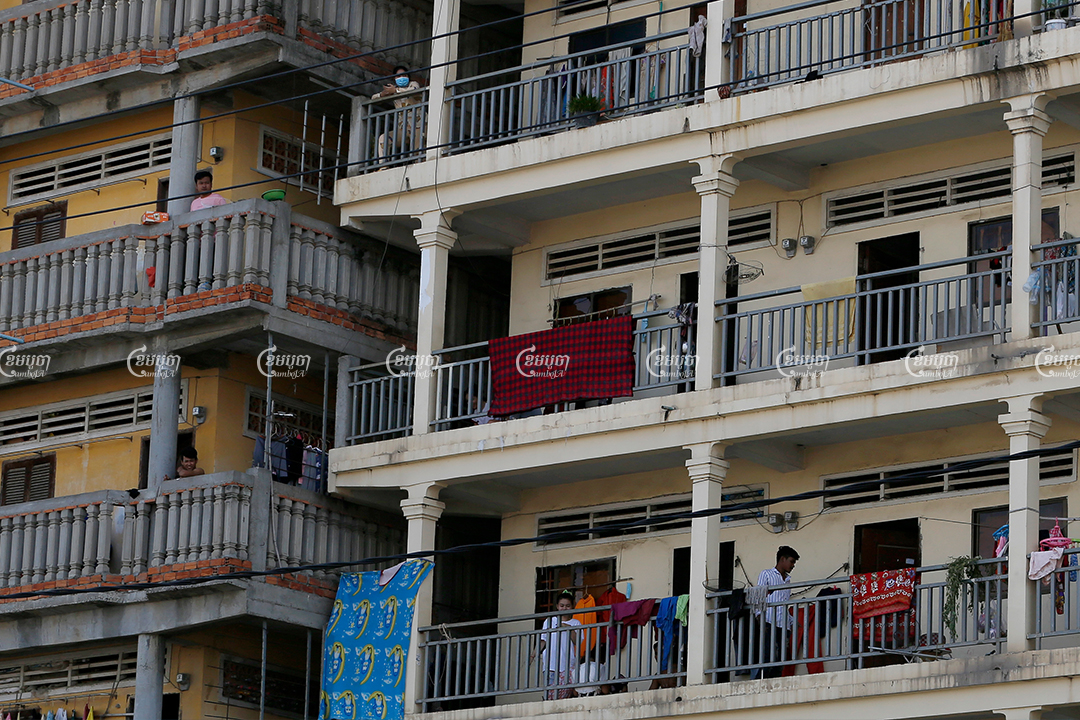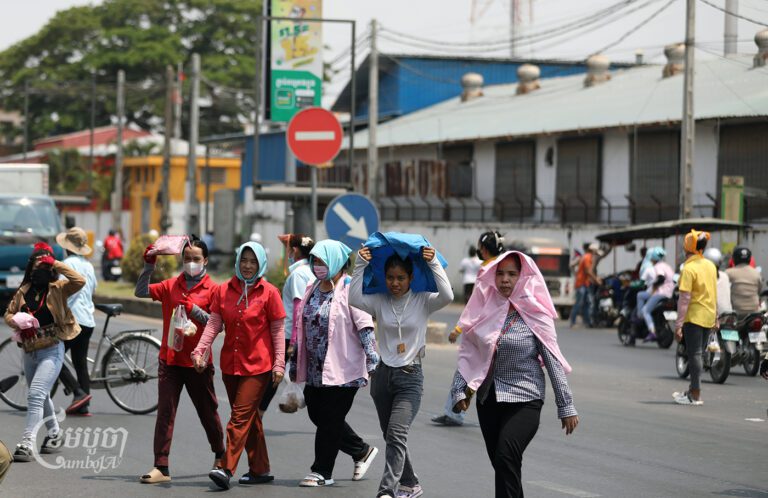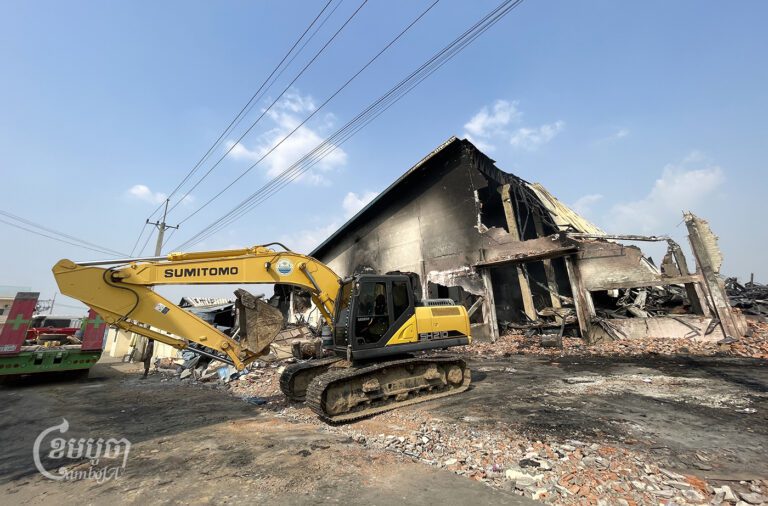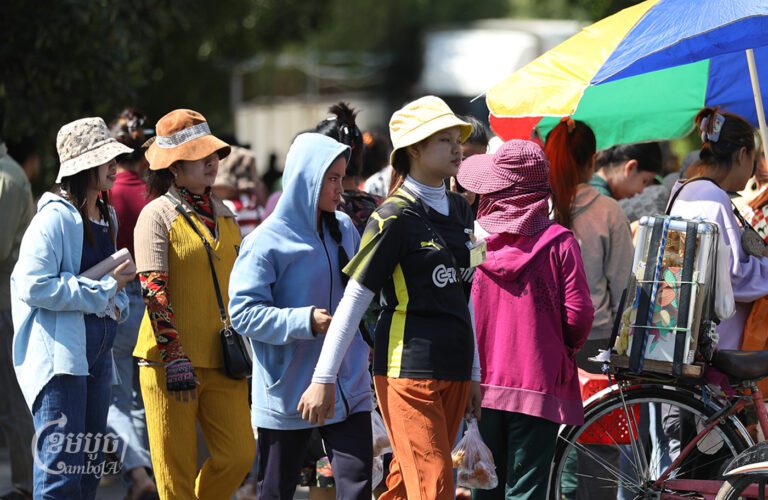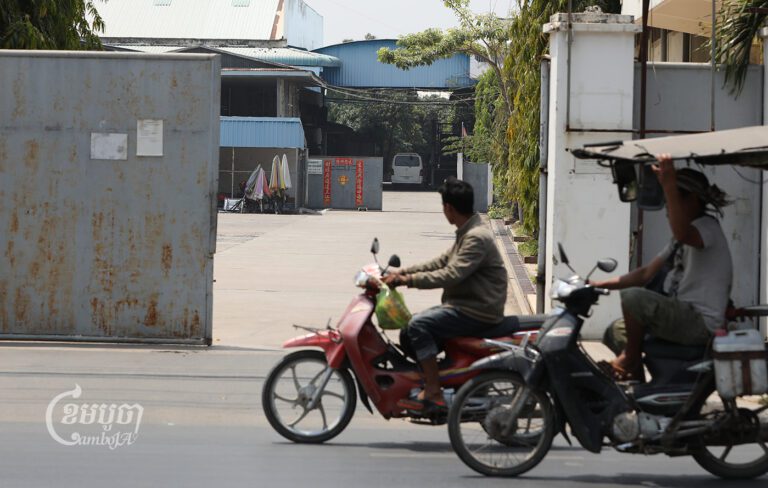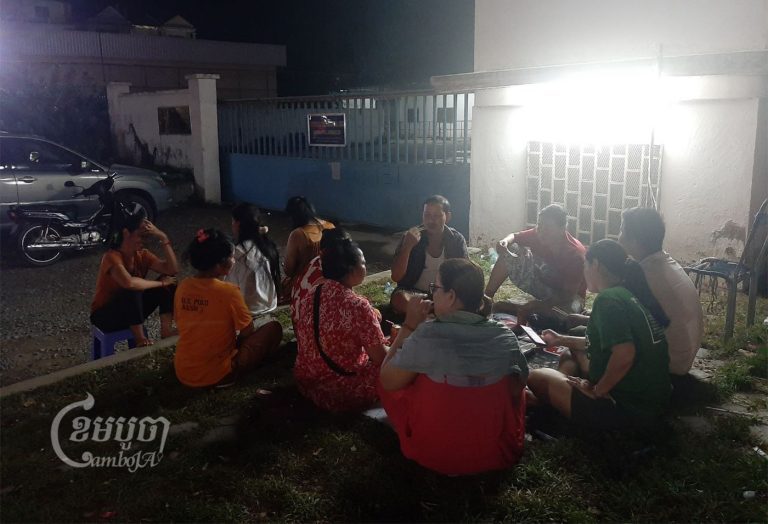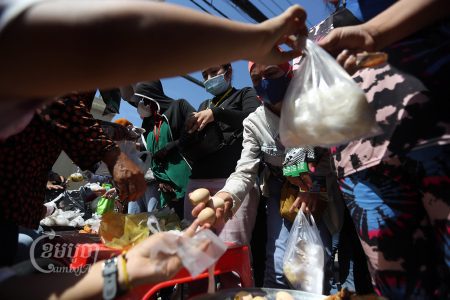Many of the thousands of garment workers now under Cambodia’s strictest COVID-19 lockdown restrictions are finding themselves unpaid, suspended indefinitely from the capital area’s hundreds of factories and, as of yet, with little help from outside.
Vann Bora, an employee at a garment factory in the Choam Chao I commune of Pur Senchey district, said he and other workers have made do in the “red zone” with little help either from their employers or the state.
“I have not yet received my first payroll and we hope to get paid during this difficult time. I just received some food donations from the landlord, and have yet to get food assistance from the authorities,” he said.
Bora is one of many workers who have relied on informal networks to get through the lockdown.
Heng Sour, a spokesman for the Ministry of Labor, said that in Phnom Penh and Takmao combined, there are about 500 garment and textile factories employing approximately 500,000 workers. As of April 15, all of this vast industry has been closed in the sweeping lockdown of the metropolitan region, the main hub of Cambodia’s vital apparel, footwear and travel goods sector.
“It is not possible to pay wages during this period, wages will be paid after the lockdown ends and, during this, it depends on the employers’ ability to help workers based on the humanitarian spirit, solidarity and social responsibility,” Sour said, adding that local authorities would provide essential food for those under lockdown.
“Therefore, in case [suspended workers] lack food or have not yet received support, they must inform the local authorities,” he said.
So far, that’s done little to help many garment workers who are now trapped with dwindling resources. Ordinarily, garment workers receive their pay twice a month, and so should have been paid before their factories were officially closed. Bora isn’t alone in reporting a lack of wages owed.
Yang Sophorn, president of Cambodian Alliance Trade Unions, said the Ministry of Labor seems to favor employers, leaving employees in dire straits.
“[Many of] the workers now owe money to the banks or microfinance institutions and are still required to pay, even in such a situation as this” she said. “This [approach] is not to help workers in difficult times, but to make them even more difficult.”
She said workers in the suburbs were facing hardships due to a lack of clean water during the lockdown, while some workers outside the lockdown areas have requested leave due to safety concerns.
The main industry group representing the sector, the Garment Manufacturers Association in Cambodia (GMAC), has said the lockdown is also seriously disrupting employers.
Even factories outside the lockdown zone are also affected, the association stated, as many staff members reside in the closed capital area. With workers prevented from going to work, these ostensibly free factories are still unable to operate normally.
GMAC President Van Sou Ieng acknowledged the hit to his producer-members, but said he hopes protecting public health contributes to long-term economic development.
He said protecting workers’ health while keeping production chains stable and mitigating the economic impact is the main priority.
“It definitely affects the country’s economy, but we need to think about the lives of people first and the health of workers, which is more important,” he said.
Sou Ieng said workers within the lockdown areas will not receive full wage, as they are regarded as having their jobs suspended in a special period.
“The government will provide some wage support for workers under lockdown areas, while factory owners will [also] offer some,” he said.
On Thursday, GMAC published a statement reiterating the severe impact of the lockdown on garment producers.
As factories face huge financial losses, so too do vulnerable workers. The GMAC letter stated the current situation has led to employment contract suspensions, meaning that, based on Cambodian labor law, employers and employees alike are free of their contractual obligations.
“Workers have no obligation to fulfill their work duty for employers and employers carries no obligation to pay wage during the contract suspension,” the appeal read. “However, seeing the hardship our workers are enduring in this critical time, GMAC strongly appeal to all members in the lockdown regions to kindly consider a certain amount of cash allowance to your workers.”
According to a Ministry of Commerce’s annual report released in early April, Cambodia in 2020 exported more than $9 billion from garments, footwear and travel goods. Besides the pandemic, the sector is also affected by the dialing-back of favourable trade conditions after the expiration of the country’s access to the US generalized scheme of preference and a 20 percent cut to the EU Everything but Arms agreement.
The Ministry of Labour and Vocational Training has instructed all companies, factories and enterprises that are suspended within the lockdown areas to pay the first round of wages in April when the situation returns to normal. Echoing GMAC, the ministry also urged employers to provide additional support during the lockdown.
That help is sorely needed by the thousands of garment workers now trapped whose labor has been so vital to the national economy.
Chhun Mom, a garment worker originally from Prey Veng province, said she heard authorities will donate food, but that she and other workers have yet to receive it.
“I and other workers here spent on food ourselves and we have not received wages. I also need to pay back a loan as well. It is very difficult now,” she said. Mom is also concerned that she will spend more on utilities, given her new lockdown schedule. “I spent at least $50 for water and electricity a month — and this month I will stay home the whole day and night, so I will spend more.”


